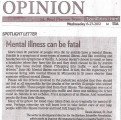Get Involved
TAKE ACTION! WRITE A LETTER TO THE EDITOR
HERE ARE SOME EXAMPLES
Dear Editor: People with mental-health issues are not ‘wackos’.
Rubén Rosario refers to people with mental-health issues as “wackos” (“Media don’t lend glory to killers,” Dec. 11). He says these “warped wackos,” people in mental health crisis who became violent, will be “bastard footnotes to the dark side of American human history.” Rosario does a great disservice to all of us who struggle every day with mental-health issues. We are not wackos. We are your brothers, sisters, moms, dads, daughters, sons, friends and co-workers. The incidence of violence in people who have a mental-health issue is not much higher than it is in the general population. Those in crisis are more often frightened, confused and despairing than violent. I agree with Rosario that the media do not attempt to glorify killers. But the media do stigmatize those who struggle with mental-health issues, and he does, too. Someday there will be a health response for people in a mental-health crisis just like there is for people in other health crises. And there will be less fear of mental illness and more understanding. Better information will lead to better prevention. So please stop calling us wackos. RENÉE JENSON, St. Paul
Confined, vulnerable, and unheard.
Dear Scott Gillespie and the Readers of the Star Tribune,
I am writing in response to the Friday, April 20, 2012 article in the B section of the Star Tribune entitled, Jailed, mentally ill, dangerous. I
I have strong, ruffled feelings about the choice of words in the title and in some places in the article. I live with and work in the mental health arena and view individuals with mental illness in a different light.– fellow humans with experiences of struggle yet full of dignity and gifts.
In the article, I agree with the author that there is a problem in the jails but what I am most saddened and angered by is the fact that the general public continues to be mislead by the articles titles such as Jailed, mentally ill, and dangerous. The public is being shocked into believing that persons with mental illness are somehow “bad”. It is a misnomer to imply mental illness with dangerousness when most of us with that health condition are very vulnerable, gentle,and loving people. People with mental illness get a bad rap from the media when reporters use such stigmatizing language. If people who have mental illnesses and are in jail and are dangerous, it is predominantly due to their being mislabeled, their confinement, lack of treatment and neglect .To explain, let me share this:
I know a young couple with two small children.( about 2 and 3 years old) These kids bite each other. They haven’t yet learned to express themselves with words well yet, but still want to express themselves. So they bite. They haven’t developed the ability to say “I’m mad about this or that.” I imagine King and others in jail with mental illness feel this way too–trapped, alone.They needn’t be labeled as “dangerous”. Instead, they need to be heard and given “a voice”. They need to be given room- in a least restricting enviroment- rather than a cell. We sometimes call a child with lack of skills, a “holy terror.” but that’s not what children are all about.
I hope that in your future articles you use a more humane and realistic manner of labeling in the articles’ title. I would suggest Confined, vulnerable, and unheard. I believe that’s what King and other other 92 or so others are all about.
DONNA DRAVES, Minneapolis







